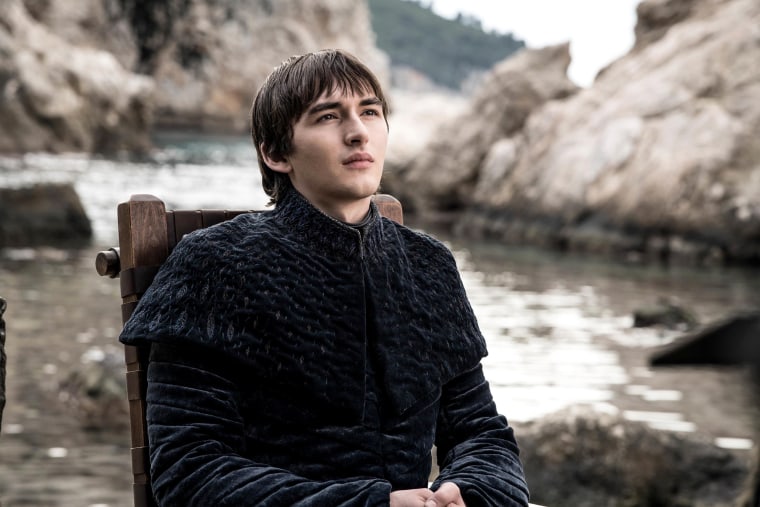In the end, the last episode of "Game of Thrones" will do little to unite a fandom already deeply split on the series’ final episodes — even if none of the events in the finale should come as a great shock. After weeks of speculation, HBO’s hit didn’t go out with a bang, but with a final divisive twist.
(Spoilers below.)
One of the reasons both the “A Song of Ice and Fire” novels and the “Game of Thrones” adaptation became such hits is because they didn’t follow the established genre rules. Fantasy, after all, is a genre of wish-fulfillment. (It’s right there in the name.) The hero survives, fulfilling his quest and probably getting a girl and a kingdom in the bargain. But that didn’t happen for Ned Stark, whose untimely end set the tone for a show that proved early and often it had no problem killing off its main protagonists.
And yet, for seven seasons, a lot of fans continued to dream that in the end, like all fantasy novels, order would come to the Seven Kingdoms. The chaos that began when Bran Stark was thrown out of a tower window all those years ago would be resolved. Never mind that the show took particular delight in setting up its heroes for increasingly insane deaths. One only need look at the fate of the Stark men to put two and two together.
Perhaps it was the resurrection of Jon Snow in season six that made fans forget this lesson. After keeping Daenerys Targaryen far from the action on Westeros for the better part of a decade, her return and immediate romance with Snow felt like the beginning of a logical resolution. Many fans spent the break between seasons seven and eight speculating Daenerys was pregnant (never mind that the show had confirmed early on she was barren). America may have fought a war to separate itself from a tyrannical king, but the pull of the hereditary monarchy remains strong in our pop cultural memory.
But "Game of Thrones" showrunners, it turns out, were playing a different, far longer game.
Like the set-up with Ned Stark in season one, the suggestion that romance and the reestablishment of a proper line of primogenitor turned out to be a red herring. Much has been made throughout the show’s run of Jon Snow’s secret birthright. In the season seven finale, it was revealed he is not just secretly the son of a Targaryen, but the legitimate heir to the throne. But this was all misdirection; When it came to the series’ endgame, Snow’s Targaryen heritage mattered about as much as Daenerys' belief that she was destined to rule the Seven Kingdoms because she once walked through fire and cracked a couple of eggs.
Following a genocidal bloodbath, Daenerys stood in the ruins of King’s Landing and proclaimed herself its leader. She was not the hero anyone had been waiting for. But her death at the hands of Jon Snow did not, as the genre traditionally would have suggested, lead to Snow’s ascension to the throne. Instead, he is put on trial and a new idea is floated: democracy.
Want more articles like this? Sign up for the THINK newsletter to get weekly updates on the hottest pop culture trends
At the suggestion of Tyrion Lannister and the urging of Sam Tarly — the show’s ultimate stand-in for author George R.R. Martin — the high-born leaders of Westeros take a vote and the most unlikely king of all is elected: Bran Stark. The argument is that his origin story will inspire the people, that his Three-Eyed Raven abilities to see the past and dream the future will help guide the country forward, and most importantly, that he can’t have kids. This last detail means his death will force a new round of elections, making them a habit Westeros hopefully won’t break.
This, too, is not actually a surprise, for those who have watched the story’s structure develop over the past eight seasons. In the end, “Game of Thrones” has always been a story about the Starks. Ned Stark was the original hero; his sons were merely following in his footsteps. And the order so long sought by fans and subjects alike ultimately involved a Stark becoming king.
But democracies are messy — President Donald Trump’s America is an almost-too-obvious example. For those who dive into fantasy seeking escapism, such an on-the-nose ending feels wrong. In contrast, monarchies are patriarchal, backwards thinking, and quite out of step with the times. Yet fantasy continues to treat the lineage of kings and queens as the natural way to preserve the peace. There are no votes to count, no hanging chads. A woman has a baby and a new leader is automatically made.
The ending of “Game of Thrones” did not make everyone happy — although it’s unlikely it ever could. It’s finale, though, did suggest the legacy of Westeros is a distinctly American one. For two centuries, the Western canon has taught that democracy is the natural outcome of freedom, and freedom is the ultimate path to happiness. Despite the chorus of complaints, this ending does feel truly fitting for the biggest television series of the 2010s.





